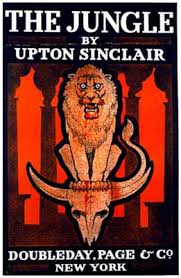.
The Jungle, be the load of crap of which I speakOUR ECONOMIC PAST
Of Meat and Myth
FEBRUARY 08, 2013 by LAWRENCE W. REED
Read the whole thing here. Some choice cuts:
The Jungle was, first and foremost, a novel. As is indicated by the fact that the book originally appeared as a serialization in the socialist journal “Appeal to Reason,” it was intended to be a polemic—a diatribe, if you will—not a well-researched and dispassionate documentary. Sinclair relied heavily both on his own imagination and on the hearsay of others. He did not even pretend that he had actually witnessed the horrendous conditions he ascribed to Chicago packinghouses, nor to have verified them, nor to have derived them from any official records.Also . . .
Sinclair hoped the book would ignite a powerful socialist movement on behalf of America’s workers. The public’s attention focused instead on his fewer than a dozen pages of supposed descriptions of unsanitary conditions in the meat-packing plants. “I aimed at the public’s heart,” he later wrote, “and by accident I hit it in the stomach.”
When the sensational accusations of The Jungle became worldwide news, foreign purchases of American meat were cut in half and the meat packers looked for new regulations to give their markets a calming sense of security. The only congressional hearings on what ultimately became the Meat Inspection Act of 1906 were held by Congressman James Wadsworth’s Agriculture Committee between June 6 and 11. A careful reading of the deliberations of the Wadsworth committee and the subsequent floor debate leads inexorably to one conclusion: knowing that a new law would allay public fears fanned by The Jungle, bring smaller rivals under controls, and put a newly laundered government seal of approval on their products, the major meat packers strongly endorsed the proposed act and only quibbled over who should pay for it.
In the end, Americans got a new federal meat inspection law, the big packers got the taxpayers to pick up the entire $3 million price tag for its implementation, as well as new regulations on the competition, and another myth entered the annals of anti-market dogma.Ⓐ Steve Ⓐ
To his credit, Sinclair actually opposed the law because he saw it for what it really was—a boon for the big meat packers. He had been a fool and a sucker who ended up being used by the very industry he hated. But then, there may not have been an industry that he didn’t hate.
No comments:
Post a Comment